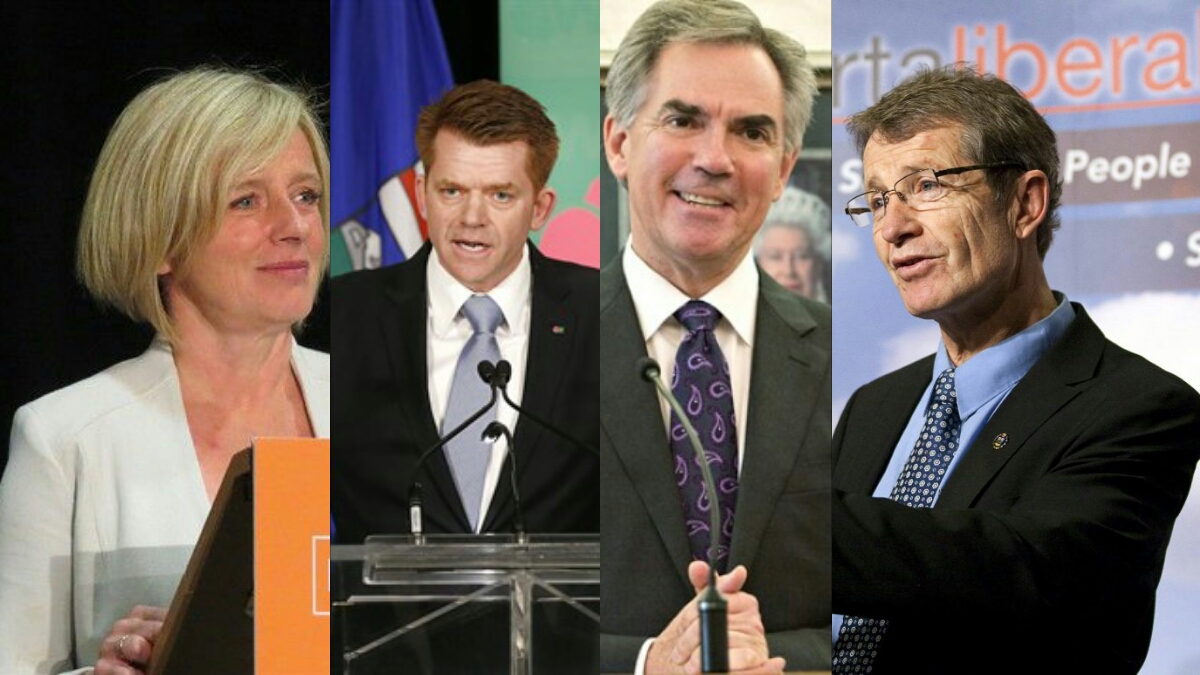The leaders of Alberta’s Wildrose and Progressive Conservative parties made a historic though not unexpected announcement on Thursday when they said they reached a tentative deal to merge the two parties.

PC leader Jason Kenney said the move was intended to ensure “the defeat of this disastrous NDP government.”
The merger will certainly be a gamechanger in the next provincial election if it comes to fruition.
READ MORE: Alberta PCs, Wildrose unveil plans to merge, create United Conservative Party
Watch below: Brian Jean, Jason Kenney announce plans to unite parties into the United Conservative Party.
The prospect of a united right had many Albertans wondering if such an initiative would have radically altered the 2015 election results in which the NDP was overwhelmingly voted into a majority.
The answer is probably not, at least according to a political analyst based in Calgary.
“I think it would have been a harder thing, in fact, I think you would have seen more votes for the NDP with a merged (conservative) party,” said Lori Williams, associate professor of policy studies at Mount Royal University.
Watch below: Now that the Wildrose and PCs have a tentative plan in place to unite, we thought we’d go back to the 2015 election results and see what things would have looked like if you add the two parties’ votes together.

“I think a merged party at that point would have still had the PC taint and it wouldn’t have worked but what many people are doing now is they’re looking at that vote in 2015, they’re looking at the combined numbers in a number of key ridings, by numbers of the PCs and the Wildrose were higher than for the NDP so that’s why this merger is happening,” she said.
“People are thinking if they can combine those votes, then they can win the next election.”
The “taint” Williams referred to is what many referred to as a sense of entitlement they believed had grown in the PC party during its decades-long run in power.
At the time of the 2015 election, the PC party had also complicated matters through a shocking floor-crossing that saw then-Wildrose leader Danielle Smith lead eight more of her party’s MLAs to join the PCs, who were led by the late Jim Prentice. It was a move that upset a number of conservative supporters from both parties.
READ MORE: Wildrose defections capped tumultuous year in Alberta politics
The PCs were also reeling from the departure of former premier Alison Redford, who resigned amid allegations of nepotism, misspending and using her position to fund an extravagant lifestyle.
READ MORE: Alberta Premier Alison Redford resigns
It would have been the “same sense of entitlement, (the) same concern about appearing out of touch,” Williams said.
“They’d still have the people and the party associated with all those scandals.”
Williams also pointed out that supporters of one conservative party may not necessarily support another conservative party more than the NDP.
`
“Go back to 2012 and the people who voted in 2012 for the Wildrose, many of them voted for the NDP in 2015.”
A poll released shortly before the 2015 election also suggested people’s second choices for which party to support is not an exact science based on ideology.
READ MORE: Exclusive: NDP poised to win Alberta election according to poll
Williams said the same possibilities must be considered should the PCs and Wildrose merge now, in time for the next election which is expected to take place in 2019.
She said believing a merger would secure a conservative victory “hinges on a number of questions – this assumes that the progressives in the Progressive Conservative party and the far-right social conservatives in the Wildrose party will continue to vote as they did in 2015. Will this merged party be a big enough tent for them to still support it?”
In the past year, a number of Progressive Conservatives have expressed concern over their observation that the party seems to be moving further to the right.
In the fall, former PC leadership contender Sandra Jansen actually left the party to join the NDP government, citing the PCs’ perceived shift to the right as one of her reasons for doing so.
READ MORE: Former PC MLA Sandra Jansen joins Alberta NDP
Williams said that, in addition to policy, ultimately leadership may determine whether a merger between the Wildrose and PCs is enough to unseat Rachel Notley as premier.
READ MORE: What an Alberta PC-Wildrose merger could mean for Rachel Notley’s NDP
“A visionary, persuasive leader with a real ability to connect… sometimes called the common touch – could bring people who have those divergent points of view together.
“There’s no guarantee that either Jason Kenney or Brian Jean are the ones to do that.”








Comments